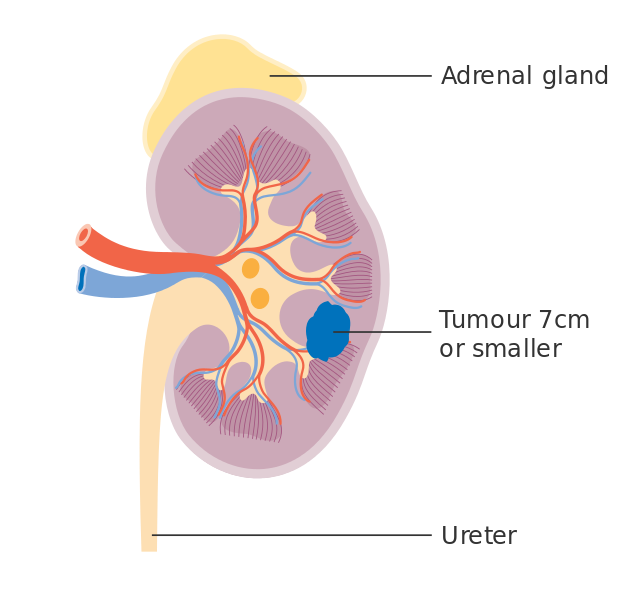Kidney Cancer Stage 1 ICD 10 is C64.1.
Tap “Watch Now” for an easy-to-understand overview of Stage 1 Kidney Cancer.
- Stage 1 Kidney Cancer
Overview
Stage 1 Kidney Cancer means that the tumor is 7 centimeters or smaller, about the size of a small peach. It also means that only one of your kidneys has been affected by the cancer.
What Tests Will I Need and Why?
Urine, Blood and Imaging tests are done to understand your general health, confirm your diagnosis and determine your cancer stage.
Tissue analysis is also typically done through a biopsy to identify the cancer cell type, which is critical to finding the best treatment option for you.
If your treatment team has not already performed tests to determine your cancer’s features, please ask your doctor when these tests will be performed.
Re-read this summary as needed and then tap, “Compare My Treatment Options Now“. Our unique Comparison Page will help you understand your FDA-approved treatment options including, who can help you pay for your treatment, where and how each is given and what side-effects you may experience.

Cancer Research U.K. CC BY-SA 4
Recommended Kidney Cancer Videos

Kidney Cancer
An Introduction

How Cancer Spreads
Metastatic = Advanced

Diagnosing Your Cancer
How Does a CT Scan Work?

Diagnosing Your Cancer
How Does a PET Scan Work?

Exercise! You Can Do It
Reducing Side Effects & More
Commonly Searched Questions
Stage 1 Kidney Cancer Survival Rate
Source: Cancer.gov
Stage 1 Kidney Cancer Symptoms
- Blood in the urine (hematuria)
- Low back pain on one side (not caused by injury)
- A mass (lump) on the side or lower back
- Fatigue (tiredness)
- Loss of appetite
- Weight loss not caused by dieting
- Fever that is not caused by an infection and that doesn’t go away
- Anemia (low red blood cell counts)
Source: Cancer.org
Stage 1 Kidney Cancer Treatment
Source: Cancer.org
Stage 1 Kidney Cancer Recurrence Rate
Source: Cancernetwork.com
Stage 1 Kidney Cancer Definition
Source: Cancer.org
Stage 1 Kidney Cancer Prevention
- Maintain a Healthy Weight: Obesity is a risk factor for kidney cancer.
- Quit Smoking: Smoking is linked to an increased risk of kidney cancer.
- Manage High Blood Pressure: Properly managing hypertension can help reduce risk.
- Eat a Balanced Diet: A diet rich in fruits, vegetables, and whole grains, and low in red and processed meats, may lower cancer risk.
- Exercise Regularly: Engage in regular physical activity.
- Limit Exposure to Certain Chemicals: If you work with chemicals such as asbestos or certain industrial substances, use protective equipment and follow safety guidelines.
Source: Cancernetwork.com













